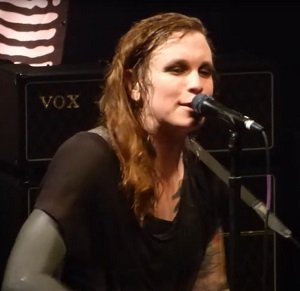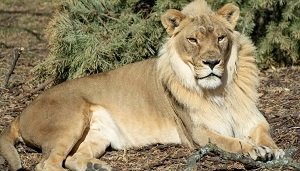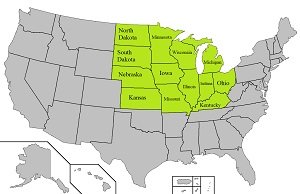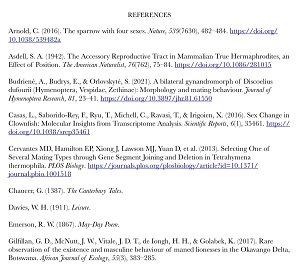“What would happen to a student who wanted to play high school sports who didn’t fit into either category of ‘girl’ or ‘boy’?” This is the dilemma Sam Mueller dramatizes in their wildly entertaining new play PIN. When nonbinary athlete Jo Wagner is kicked off their high school wrestling team, their longtime rival MJ McKinnon comes up with a plan to stage a guerrilla final match in a local barn. Local shock jocks, the principal, and their biology teacher all get in the act and the event grows in scope, joy, imagination, and complications.
PIN. will have its first public reading on Thursday, May 25 at 3:00 PM at the Ensemble Studio Theatre as part of the 2023 EST/Sloan First Light Festival. The reading is free but reservations are encouraged.
Sam smacked down as many questions as we could ask below.
(Interview by Rich Kelley)
Please tell us the story of how PIN. came to be.
PIN. probably started in the pit of a punk concert in Bloomington-Normal, Illinois in April of 2017 watching Laura Jane Grace, frontwoman of the band Against Me!, growl out songs to a visibly gender-nonconforming crowd. I left the venue that night having inhaled some embers that five years later kicked up into the full flame that became this play. It didn't fan into a fire until Thanksgiving 2021. I had been thinking about the safety of trans kids and looking over some recent legislation surrounding trans kids in high school sports. I wanted to make space for the trans-nonbinary kids who are often left out of these conversations because the understanding of trans identity in mainstream society can be incredibly binary. What would happen to a student who wanted to play sports who didn't fit into either category of "girl" or "boy"? Moreover, what would happen if that student had real advocates for their ability to not only survive but thrive?
Why this play? Why now?
Because the coolest stories ever are found in a biology textbook and also right outside of your window right now. Because pro wrestling is also drag. Because you can't say gay in Florida schools. Because trans people cannot get their life-saving medical care. Because the changes we have to make in this country are so big it becomes overwhelming to the point of inaction and sometimes people just need to see it to know what's possible. Because being larger than life can feel so thrilling. Because there is nothing like the feeling of knowing and existing in your own expansiveness.
Is the story of the play based on an actual incident involving a nonbinary high school wrestler?
Yes and no. I read and listened to a lot of stories about transgender high school athletes in the creation of this play. All of those stories would end before I wanted this one to begin. I wanted to know what happens after the decisions are made and someone can no longer compete. I was interested in the fall out and the comeback.
Everyone would love to have a biology teacher as charismatic, knowledgeable, and irascible as Mr. Rodgers. Is he based on anyone you read about or know?
My director, Lucky Stiff, actually said to me the other day "You wrote the advocate [trans kids] all wish we had in high school." I certainly didn't have a Tom Rodgers. Ironically, I hated biology in high school (I refused to dissect the frogs) and when it came time to choose a science to study further, I decided I would rather take chemistry instead. What I do have in my life are people who advocate the way that Rodgers does, with a dual foundation in knowledge and charisma. Bits and pieces of those people are found in Rodgers.
You have Mr. Rodgers cite so many examples of nonbinary sexual differentiation in nature in his teaching sessions: clownfish, butterflies, lionesses, white-throated sparrows. Do you have a favorite?
I do not. I just tried to choose one. I can't do it. They have all actually taught me so much. I have a Leo moon though, so the lionesses have a slight edge if I had to choose.
Are you now or have you ever been a wrestler?
Okay. Hear me out. At Northwestern (my alma mater), there used to be a yearly event called Wrestlepocalypse (aka Pocs) and it would happen at the end of every May. I was a part of the student theater group that produced the event and for several years, I was the stage manager. This was less "writing down blocking and calling cues" and more "risk management". It is where my love of wrestling began and also never again in my life do I want to be responsible for more than a dozen twenty-somethings teaching each other how to do professional wrestling moves. Pocs forever, though. You haven't lived until you've been inside of a wrestling ring.
How much real wrestling will your actors have to do onstage?
A lot! The radio DJs are spared from the deep physicality of wrestling, but the academics and the athletes? There's a whole tag team match! The athletes get to pivot between competition wrestling and professional wrestling, too, so there's that as well.
People sometimes wonder why nonbinary people continue to live in states that are hostile to them. At one point in the play Jo is quite moving describing why they want to continue living in the “Corn Belt.” Have you spent any time in the Corn Belt?
I have a very, very special place in my heart for the Corn Belt. I've spent a lot of time there. One of my favorite drives is from Illinois to Missouri. Once, I rode shotgun on an overnight drive from Chicago to St. Louis and when the sun was starting to rise, we were driving through thick, pink-tinted fog that seemed to go on forever. It made our skin look like it had a rosy glow to it. We were beautiful aliens. I felt like I was no longer on earth. It is a perfect memory.
The footnotes you include in the script of the play demonstrate the considerable research you did about the biology of sexual differentiation. How do you imagine the footnotes could be incorporated into a stage production?
It depends, really. I feel like all of my answers would pale in comparison to a creative team's ideas. You can project them, you can attach a sound or light cue to them, you can make the floor beneath an audience vibrate every time they exist, you can pass out the script with footnotes to audience members who want to read along. All of these things tie into making the play more accessible, too. I make a note in the beginning of the play that says "Academia should be a playground. How else do we learn?" I've always thought about this play being in communication with designers and an audience, and with the footnotes, I made a space for other people to play if they want.
I’ve never known anyone to be so impassioned about footnotes.
The footnotes came from a desire to bring the art of writing a scientific peer-reviewed paper to the art of writing a play. What I love about the footnotes is they also ask "How do we peer-review plays? How do we tie plays together into a lineage of not only other plays but the innovations and understanding of the time the play was written? How does a play serve as an artifact of understanding, meant to be engaged with and built off of and all of those other beautiful things that scientific papers do?" I was a scholarship kid at an esteemed university; I often found that academia did not want me in a number of ways, but I LOVE learning. I love it SO much. This is also my way of reclaiming my own learning.
When did you know you were a playwright? What playwrights have influenced you?
I knew I was a playwright in college when Laura Schellhardt, the head of the department and one of my earliest mentors, let me into one of her classes. She picked one of my first homework assignments as the example to read out loud in class and I remember thinking, "This is incredible. I kind of want to vomit. I might want to do this forever."
Taylor Mac teaches me a lot about imagination. The Bengsons teach me a lot about vulnerability and honesty and bravery. Nia Robinson teaches me a lot about deep love and concern and also joy. Paula Vogel teaches me a lot about catharsis. Antoinette Nwandu teaches me about the deliberate power of each individual word. I work a lot with undergraduates, and honestly writing better worlds for them, with all of their spark and teeth, is a huge influence on my work.
You are a member of EST’s Youngblood program. What impact has being in Youngblood had on your playwriting?
Youngblood is a home. I get to listen to beautiful stories every Wednesday before other people get to know them; it's like having a front row seat to people's brilliance. These writers have also cooked for me and reminded me to drink more water and told me stories about their lives and showed me a kind of community-based love that is very hard to find because of how our society's priorities are ordered. RJ and Graeme have been beautiful champions of my work and my creative process. I'm trying not to miss it while I'm still a part of it.
What’s next for Sam Mueller?
On the playwriting front — I started a two-hander Western play about brothers on a hunt for a Bighorn sheep when I was in Wyoming on an artist residency at the Ucross Foundation this past February. On the personal front — I turn 30 the day after the First Light reading of PIN. I'm looking forward to ringing in a new chapter while also being loyal to my inner 13-year-old. And then hopefully, a lot of things I couldn't even dream up.









